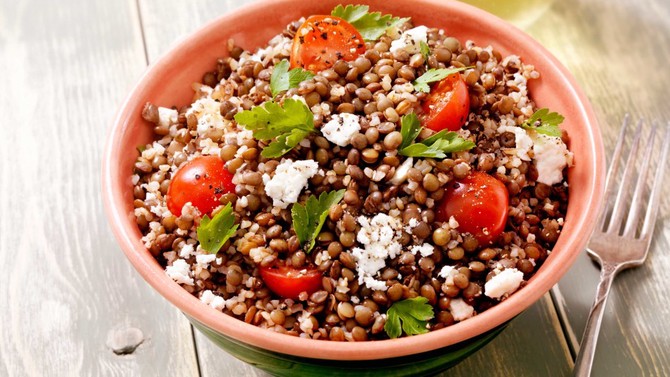The Best Foods for Your Age, According to Science
Eating healthfully is always important, but the nutrients you need most can vary by the decade. Here's your guide to what to eat and when from your 20s through your 60s and beyond.
By Emma Haak
In Your 40s
The Food: Lentils
Why: "Plenty of my patients have slowing metabolisms in their 30s, but it's more common after 40," says Kirkpatrick. "That's when the weight, especially belly fat, starts coming on and it becomes really difficult to take it off." With 15 grams of fiber in a 1 cup serving, lentils are among the highest-fiber foods, and can help you manage your weight in an easy way. In a small 2015 study in the Annals of Internal Medicine, focusing solely on fiber intake (30 grams per day) was nearly as effective for weight loss as a more complicated diet that required followers to eat more fruits, vegetables, fish and lean protein plus cut back on salt, sugar, fat and alcohol.
Where else you can get fiber: Fruits like berries, apples and pears are excellent fiber sources, as are whole-wheat spaghetti, popcorn, beans and vegetables like peas and broccoli.
The Food: Grilled Chicken Breast
Why: Your 40s are when you need to start minding your blood sugar, because your diabetes risk is higher. Lean protein can help limit fluctuations and the insulin your body pumps out in response to blood sugar spikes, says Sweeney. Sixty-three percent of diabetes diagnoses happen between the ages of 40 and 64, according to the most recent national data from the Centers for Disease Control and Prevention, and the National Institutes of Health recommends that you start getting tested for diabetes and pre-diabetes at age 45. (You should talk to your doctor about getting tested earlier if you're overweight or have other risk factors like high blood pressure or cholesterol.) Lean protein can also help counteract the changes in body composition that happen in the years leading up to menopause, says Kirkpatrick, when lean muscle tends to drop while body fat increases.
Where else you can get lean protein: Look for lean ground beef, lean cuts of pork and, for your non-meat options, choose Greek yogurt or eggs.
The Food: Walnuts
Why: They're incredibly high in omega-3 fatty acids. Recommended in your 30s for your joints, in your 40s, these fats may be just as important for your state of mind. There's a link between inflammation and depression, and omega-3s have anti-inflammatory effects on the body. Here's why that matters right now: Women between the ages of 40 and 59 had the highest rates of depression, according to data gathered by the CDC between 2009 and 2012.
Where else you can get omega 3s: You know that fatty fish and seeds are among your best options, but lesser known sources include spinach, tofu and navy beans.
Published 10/26/2016


